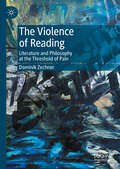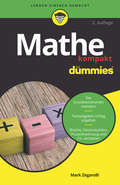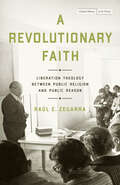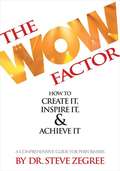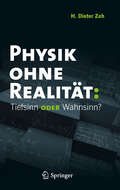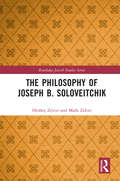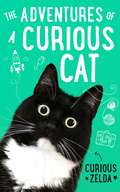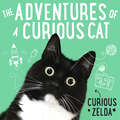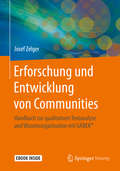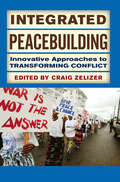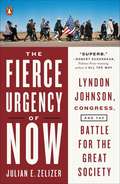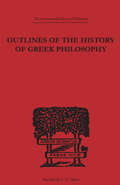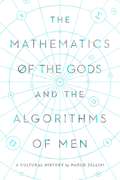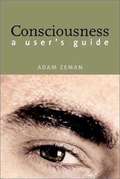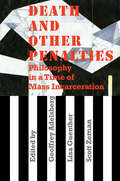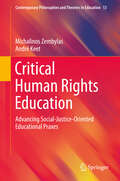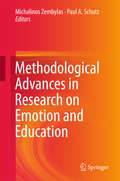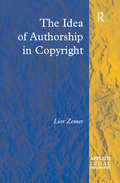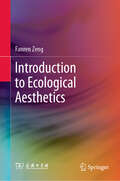- Table View
- List View
The Violence of Reading: Literature and Philosophy at the Threshold of Pain
by Dominik ZechnerThe Violence of Reading: Literature and Philosophy at the Threshold of Pain expounds the scene of reading as one that produces an overwhelmed body exposed to uncontainable forms of violence. The book argues that the act of reading induces a representational instability that causes the referential function of language to collapse. This breakdown releases a type of “linguistic pain” (Scarry; Butler; Hamacher) that indicates a constitutive wounding of the reading body. The wound of language marks a rupture between linguistic reality and the phenomenal world. Exploring this rupture in various ways, the book brings together texts and genres from diverse traditions and offers close examinations of the rhetoric of masochism (Sacher-Masoch; Deleuze), the relation between reading and abuse (Nietzsche; Proust; Jelinek), the sublime experience of reading (Kant; Kafka; de Man), the “novel of the institution” (Musil; Campe), and literary suicide (Bachmann; Berryman; Okkervil River).
The Legal Dimensions of Oil and Gas in Iraq
by Rex J. ZedalisThis volume presents the first and only comprehensive examination of the legal issues surrounding international debt recovery on claims against Iraqi oil and gas. In addition to presenting a snapshot view of Iraq's outstanding debt obligations and an analysis of the significance of the theory of odious debt in the context of the Iraqi situation, the list of legal issues examined includes relevant provisions of the Iraqi Constitution of 2005, controlling Security Council resolutions, pertinent articles of the KRG oil and gas law (No. 22) of 2007 and the many nuanced and technical questions raised thereby, legal pronouncements aimed at protecting Iraqi oil and gas and those adopted in selected other nations, and general problems associated with recognition and enforcement of awards or judgments that may involve such oil and gas or revenues from the sale thereof. Also discussed are the lessons learned by the handling of the Iraq debt experience and the transferability of those lessons to future situations in which resource-rich nations may have outstanding financial obligations to other members of the world community or their nationals.
Mathe kompakt für Dummies (Für Dummies)
by Mark ZegarelliMathematik ist nicht jedermanns Sache und oft hapert es schon an den Grundlagen. Frei nach dem Motto "Einst gelernt, doch längst vergessen" bereiten oft gerade die einfachen Fragestellungen Probleme. Wie viel Prozent sind das nochmal? Wie war das doch gleich mit der Bruchrechnung und wie berechnet man eigentlich den Flächeninhalt eines Dreiecks? Mark Zegarelli erklärt es Ihnen, einfach und zugleich amüsant. Dabei kommt er immer schnell auf den Punkt und hilft Ihnen so, Ihre Wissenslücken zu schließen.
A Revolutionary Faith: Liberation Theology Between Public Religion and Public Reason (Cultural Memory in the Present)
by Raúl E. ZegarraReligious commitments can be a powerful engine for progressive social change, and in this new book, Raúl E. Zegarra examines the process of articulation of religious beliefs and political concerns that takes place in religious organizing and activism. Focusing on the example of Latin American liberation theology and the work of Peruvian theologian Gustavo Gutiérrez, Zegarra shows how liberation theology advocates have been able to produce a new balance between faith and politics that advances an agenda of progressive social change without reducing politics to faith or faith to politics. Drawing from theologian David Tracy's method of critical correlation, the book focuses on key historical, philosophical, and theological shifts that have allowed liberation theologians to produce a new interpretation of the relationship between faith and politics in the Christian tradition, especially when issues of social justice are at stake. The book further approaches liberation theology's contributions to theorizing social justice through an unconventional path: a critical dialogue with the work of philosopher John Rawls. This dialogue, as Zegarra contends, allows us to see more clearly the contributions of liberation theology to the cause of progressive social change. Ultimately the book stands between "public religion" and "public reason," offering something of a blueprint for theological innovation and for how to remain committed to one's faith while respecting and defending the core values of democracy.
The Wow Factor: A Comprehensive Guide for Performers
by Steve ZegreeDr. Steve Zegree of Western Michigan University, choral arranger and conductor of Western Michigan's Gold Company has developed this practical guide for performers, students, teachers and parents which offers fundamental philosophies and concepts that are essential to a person's growth and development and will contribute to a successful professional life in music.
Physik ohne Realität: Tiefsinn oder Wahnsinn?
by H. Dieter ZehBeschreiben die Begriffe der modernen Physik tatsächlich die Realität oder sind sie nur Hilfsmittel und Rechenwerkzeuge? Wie können reale Objekte aus Atomen aufgebaut sein, wenn diese angeblich gar keine realen Eigenschaften vor deren Messung besitzen? In philosophischen und meist allgemein verständlichen Aufsätzen setzt sich der Autor - Begründer des Dekohärenzkonzepts in der Quantentheorie - mit den "faulen Ausreden" auseinander, die Physiker finden, um unerwarteten Konsequenzen, die sich aus ihren eigenen Theorien ergeben, aus dem Weg zu gehen.
Pfade und Berge: Entwurf einer allgemeinen Theorie transformatorischer Bildungsprozesse am Beispiel des japanischen Kyōgen (Kindheit – Bildung – Erziehung. Philosophische Perspektiven)
by Klaus-Christian ZehbeTransformatorische Bildungstheorien beschreiben ›Bildung‹ zumeist als Wandlung von Selbst-, Welt- und Fremdverhältnissen. Empirisch werden solche Wandlungsprozesse häufig rückblickend über einschneidende biographische Ereignisse rekonstruiert. Doch wie kann man alltägliche Wandlungen und Prozesse des ›sich bildens‹ in ihren Entstehungskontexten beschreiben? Die stark kodifizierte, japanische Theaterform des Kyōgen bietet einen lebensweltlichen Rahmen, in dem alltägliche Prozesse des ›sich bildens‹ beobachtbar werden. Auf der Grundlage von bildungstheoretischen Überlegungen und ethnographisch teilnehmender Beobachtung wird mittels der Q-Methodology ein eigenständiger, theoretischer und methodischer Ansatz entwickelt, der erlaubt, alltägliche Bildungsprozesse in einem gegebenen Feld ›vorausblickend‹ zu rekonstruieren. Die Studie eröffnet damit einen neuen Zugang sowie ein neues Forschungsfeld für die qualitative empirische Bildungsforschung.
Rulers and Ruled
by Irving M. ZeitlinThis book illuminates several timeless principles of political philosophy that have come down to us through the ages in the writings of Plato, Aristotle, Machiavelli, Hobbes, Locke, Montesquieu, Rousseau, and the authors of the Federalist Papers, Madison, Hamilton, and Jay. Among these principles are the following: that a good society is based on law; that a good constitution balances social classes against each other; that a mixed constitution is best for this purpose; that popular sovereignty is the best foundation for a just and stable constitution; and that representative government is best for a large, complex society.In this valuable and accessibly written guide to the fundamentals of political thought, Irving Zeitlin shows that certain thinkers have given us insights that rise above historical context - 'trans-historical principles' that can provide the political scientist with an element of foresight, an ability not to predict events but to anticipate a certain range of possibilities. While the historian studies unique and unrepeatable circumstances such as those, for example, that gave rise to Julius Caesar, the political theorist, using these trans-historical principles, recognizes the conditions that can lead to Caesarism.Zeitlin draws on an unusual depth of knowledge, offering a lucid, interesting, and memorable summation of his chosen classic texts, in a work that will appeal strongly to his intended audience at the undergraduate level.
The Philosophy of Joseph B. Soloveitchik (Routledge Jewish Studies Series)
by Heshey Zelcer Mark ZelcerProviding a concise but comprehensive overview of Joseph B. Soloveitchik’s larger philosophical program, this book studies one of the most important modern Orthodox Jewish thinkers. It incorporates much relevant biographical, philosophical, religious, legal, and historical background so that the content and difficult philosophical concepts are easily accessible. The volume describes his view of Jewish law (Halakhah) and how he takes the view to answer the fundamental question of Jewish philosophy, the question of the "reasons" for the commandments. It shows how numerous of his disparate books, essays, and lectures on law, specific commandments, and Jewish religious phenomenology, can be woven together to form an elegant philosophical program. It also provides an analysis and summary of Soloveitchik’s views on Zionism and on interreligious dialogue and the contexts for Soloveitchik’s respective stances on two issues that were pressing in his role as a leader of a major branch of post-war Orthodox Judaism. The book provides a synoptic overview of the philosophical works of Joseph B. Soloveitchik. It will be of interest to historians and scholars studying neo-Kantian philosophy, Jewish thought and philosophy of religion.
The Adventures of a Curious Cat: wit and wisdom from Curious Zelda, purrfect for cats and their humans
by Curious Zelda'A purrfect gift for a loved one with a special affinity for the feline' 'An absolute must for any cat lover''Curiosity is more than a desire to discover. It's a lifestyle, and a purrvilege. It's hours of observing a fly on the wall. It's entering the sock drawer just before it closes. It's sniffing the lampshade one more time . . .'Such is the wisdom of Curious Zelda: social media star, agony aunt, yoga teacher, cat. In The Adventures of a Curious Cat she gives insight into her view of the world and dispenses unparalleled wisdom. Zelda explains, in her unique voice, how to handle humans, how to communicate with furniture, and most importantly how to live a life curiously. It's the ultimate self-help guide for any cat, or indeed, their human.
The Adventures of a Curious Cat: wit and wisdom from Curious Zelda, purrfect for cats and their humans
by Curious Zelda'A purrfect gift for a loved one with a special affinity for the feline''An absolute must for any cat lover''Curiosity is more than a desire to discover. It's a lifestyle, and a purrvilege. It's hours of observing a fly on the wall. It's entering the sock drawer just before it closes. It's sniffing the lampshade one more time . . .'Such is the wisdom of Curious Zelda: social media star, agony aunt, yoga teacher, cat. In The Adventures of a Curious Catshe gives insight into her view of the world and dispenses unparalleled wisdom. Zelda explains, in her unique voice, how to handle humans, how to communicate with furniture, and most importantly how to live a life curiously. It's the ultimate self-help guide for any cat, or indeed, their human.
The Adventures of a Curious Cat: wit and wisdom from Curious Zelda, purrfect for cats and their humans
by Curious Zelda'Curiosity is more than a desire to discover. It's a lifestyle, and a purrvilege. It's hours of observing a fly on the wall. It's entering the sock drawer just before it closes. It's sniffing the lampshade one more time . . .'Such is the wisdom of Curious Zelda: social media star, agony aunt, yoga teacher, cat. In The Adventures of a Curious Cat she gives insight into her view of the world and dispenses unparalleled wisdom. Zelda explains, in her unique voice, how to handle humans, how to communicate with furniture, and most importantly how to live a life curiously. It's the ultimate self-help guide for any cat, or indeed, their human.
Erforschung und Entwicklung von Communities: Handbuch zur qualitativen Textanalyse und Wissensorganisation mit GABEK®
by Josef ZelgerDieses Buch untersucht die Entwicklung von Communities mit Hilfe des GABEK®-Verfahrens Was hält Gemeinschaften zusammen? Diese Frage erforscht dieses Buch über die Entwicklung von Communities. Wichtiges Werkzeug ist dabei das Verfahren GABEK® (GAnzheitliche BEwältigung von Komplexität). Es analysiert u. a. Konzepte, Ontologien, Wertvorstellungen, Meinungen über Ursachen und Wirkungen sowie emotionale Einstellungen, die die Mitglieder einer Community verbinden. Durch eine softwareunterstützte Textanalyse werden sie in Form linguistischer Netze systematisiert. Diese Netze werden wiederum als Meinungslandkarten in unterschiedlichen Komplexitätsstufen dargestellt. Das Buch zeigt, wie Sie auf diese Weise Denk- und Handlungsmuster ableiten, die bei der Entwicklung von Communities oder auch bei der Organisationsentwicklung eine große Rolle spielen. Durch qualitative Textanalysen ermöglicht GABEK das Verständnis der Gesamtsituation und die Theoriebildung. Das Verfahren erleichtert die Konfliktlösung und eine Ausrichtung der Community auf strategische Ziele und Zukunftsvisionen, die von den meisten Betroffenen akzeptiert werden, auch wenn es um Erneuerung und Reformen geht.Theoretische Grundlagen werden mit Anwendungsbeispielen verknüpft Nach einer kurzen Beschreibung der qualitativen Methoden des GABEK-Verfahrens, untersucht dieses Buch die Entwicklung von Communities am Beispiel des Stadtteils Tepito in Mexico City. Anschließend befasst sich dieses Werk mit speziellen Themen, die mit der Gemeinschaftsbildung verbunden sind wie etwa:Sinn- und BedeutungszusammenhängeBegriffsanalysen durch BedeutungszusammenhängeVon Begriffsnetzen zu Ontologien durch KomplexitätsreduktionLinguistische GestaltbildungBewusste und unbewusste WissensverarbeitungProblemlösung durch den simulierten DialogUm die Entwicklung von Communities aufschlussreich zu untersuchen, liefert Ihnen dieses Buch neben theoretischen Grundlagen auch immer wieder konkrete Anwendungsbeispiele des Verfahrens GABEK, das Sie bei der Entscheidungsfindung und Organisationsentwicklung unterstützt. Abschließend beschreibt der Autor eine Zukunftsvision über die Entwicklung von Communities durch ein System der dynamischen Wissensorganisation. Auf diese Weise zeigt Ihnen dieses Werk mögliche Wege zu einer zukunftsorientierten Entwicklung von Organisationen, Gemeinden, Regionen oder Vereinen und Interessensgemeinschaften auf.
Integrated Peacebuilding
by Craig ZelizerIntegrated Peacebuilding addresses the importance of weaving peacebuilding methods into diverse sectors including development, humanitarian assistance, gender, business, media, health, and the environment--areas where such work is needed the most. Incorporating peacebuilding approaches in these fields is critical for transforming today's protracted conflicts into tomorrow's sustainable peace. Covering both theory and practice, Dr. Zelizer and his team of leading academics and practitioners present original essays discussing the infrastructure of the peacebuilding field--outlining key actors, donors, and underlying motivations--as well as the ethical dilemmas created by modern conflict. Exploring both the challenges and lessons to be found in this emerging field, Integrated Peacebuilding is perfect for courses on peacebuilding, conflict resolution, international development, and related fields.
The Fierce Urgency of Now
by Julian E. ZelizerA majestic big-picture account of the Great Society and the forces that shaped it, from Lyndon Johnson and members of Congress to the civil rights movement and the mediaBetween November 1963, when he became president, and November 1966, when his party was routed in the midterm elections, Lyndon Johnson spearheaded the most transformative agenda in American political history since the New Deal, one whose ambition and achievement have had no parallel since. In just three years, Johnson drove the passage of the Civil Rights and Voting Rights Acts; the War on Poverty program; Medicare and Medicaid; the National Endowments for the Arts and the Humanities; Public Broadcasting; immigration liberalization; a raft of consumer and environmental protection acts; and major federal investments in public transportation. Collectively, this group of achievements was labeled by Johnson and his team the "Great Society."In The Fierce Urgency of Now, Julian E. Zelizer takes the full measure of the entire story in all its epic sweep. Before Johnson, Kennedy tried and failed to achieve many of these advances. Our practiced understanding is that this was an unprecedented "liberal hour" in America, a moment, after Kennedy's death, when the seas parted and Johnson could simply stroll through to victory. As Zelizer shows, this view is off-base: In many respects America was even more conservative than it seems now, and Johnson's legislative program faced bitter resistance. The Fierce Urgency of Now animates the full spectrum of forces at play during these turbulent years, including religious groups, the media, conservative and liberal political action groups, unions, and civil rights activists.Above all, the great character in the book whose role rivals Johnson's is Congress--indeed, Zelizer argues that our understanding of the Great Society program is too Johnson-centric. He discusses why Congress was so receptive to passing these ideas in a remarkably short span of time and how the election of 1964 and burgeoning civil rights movement transformed conditions on Capitol Hill. Zelizer brings a deep, intimate knowledge of the institution to bear on his story: The book is a master class in American political grand strategy.Finally, Zelizer reckons with the legacy of the Great Society. Though our politics have changed, the heart of the Great Society legislation remains intact fifty years later. In fact, he argues, the Great Society shifted the American political center of gravity--and our social landscape--decisively to the left in many crucial respects. In a very real sense, we are living today in the country that Johnson and his Congress made.
The Fierce Urgency of Now
by Julian E. ZelizerA majestic big-picture account of the Great Society and the forces that shaped it, from Lyndon Johnson and members of Congress to the civil rights movement and the mediaBetween November 1963, when he became president, and November 1966, when his party was routed in the midterm elections, Lyndon Johnson spearheaded the most transformative agenda in American political history since the New Deal, one whose ambition and achievement have had no parallel since. In just three years, Johnson drove the passage of the Civil Rights and Voting Rights Acts; the War on Poverty program; Medicare and Medicaid; the National Endowments for the Arts and the Humanities; Public Broadcasting; immigration liberalization; a raft of consumer and environmental protection acts; and major federal investments in public transportation. Collectively, this group of achievements was labeled by Johnson and his team the "Great Society."In The Fierce Urgency of Now, Julian E. Zelizer takes the full measure of the entire story in all its epic sweep. Before Johnson, Kennedy tried and failed to achieve many of these advances. Our practiced understanding is that this was an unprecedented "liberal hour" in America, a moment, after Kennedy's death, when the seas parted and Johnson could simply stroll through to victory. As Zelizer shows, this view is off-base: In many respects America was even more conservative than it seems now, and Johnson's legislative program faced bitter resistance. The Fierce Urgency of Now animates the full spectrum of forces at play during these turbulent years, including religious groups, the media, conservative and liberal political action groups, unions, and civil rights activists.Above all, the great character in the book whose role rivals Johnson's is Congress--indeed, Zelizer argues that our understanding of the Great Society program is too Johnson-centric. He discusses why Congress was so receptive to passing these ideas in a remarkably short span of time and how the election of 1964 and burgeoning civil rights movement transformed conditions on Capitol Hill. Zelizer brings a deep, intimate knowledge of the institution to bear on his story: The book is a master class in American political grand strategy.Finally, Zelizer reckons with the legacy of the Great Society. Though our politics have changed, the heart of the Great Society legislation remains intact fifty years later. In fact, he argues, the Great Society shifted the American political center of gravity--and our social landscape--decisively to the left in many crucial respects. In a very real sense, we are living today in the country that Johnson and his Congress made.
Outlines of the History of Greek Philosophy (International Library of Philosophy)
by Eduard ZellerFirst published in 2000. Routledge is an imprint of Taylor & Francis, an informa company.
The Mathematics of the Gods and the Algorithms of Men: A Cultural History
by Paolo ZelliniA masterful cultural history of mathematics from bestselling Italian mathematician and philosopher Paolo Zellini.Is mathematics a discovery or an invention? Have we invented numbers or do they truly exist? What sort of reality should we attribute to them? Mathematics has always been a way of understanding and ordering the world: from sacred ancient texts and pre-Socratic philosophers to twentieth-century logicians such as Russell and Frege and beyond. In this masterful, elegant book, mathematician and philosopher Paolo Zellini offers a brief cultural and intellectual history of mathematics, from ancient Greece to India to our contemporary obsession with algorithms, showing how mathematical thinking is inextricably linked with philosophical, existential and religious questions—and indeed with our cosmic understanding of the world.
Consciousness: A User's Guide
by Adam ZemanThis engaging and readable book provides an introduction to consciousness that does justice both to the science and to the philosophy of consciousness, that is, the mechanics of the mind and the experience of awareness. The book opens with a general discussion of the brain and of consciousness itself. Then, exploring the areas of brain science most likely to illuminate the basis of awareness, Zeman focuses on the science of sleep and waking and on the science of vision. He describes healthy states and disorders--epilepsy, narcolepsy, blindsight and hallucinations after stroke--that provide insights into the capacity for consciousness and into its contents. And he tracks the evolution of the brain, the human species, and human culture and surveys the main current scientific theories of awareness, pioneering attempts to explain how the brain gives rise to experience. Zeman concludes by examining philosophical arguments about the nature of consciousness. A practicing neurologist, he animates his text with examples from the behavioral and neurological disorders of his patients and from the expanding mental worlds of young children, including his own. His book is an accessible and enlightening explanation of why we are conscious.
Death and Other Penalties: Philosophy in a Time of Mass Incarceration
by Scott Zeman Lisa Guenther Geoffrey AdelsbergMass incarceration is one of the most pressing ethical and political issues of our time. In this volume, philosophers join activists and those incarcerated on death row to grapple with contemporary U.S. punishment practices and draw out critiques around questions of power, identity, justice, and ethical responsibility. This work takes shape against a backdrop of disturbing trends: The United States incarcerates more of its own citizens than any other country in the world. A disproportionate number of these prisoners are people of color, and, today, a black man has a greater chance of going to prison than to college. The United States is the only Western democracy to retain the death penalty, even after decades of scholarship, statistics, and even legal decisions have depicted a deeply flawed system structured by racism and class oppression. Motivated by a conviction that mass incarceration and state execution are among the most important ethical and political problems of our time, the contributors to this volume come together from a diverse range of backgrounds to analyze, critique, and envision alternatives to the injustices of the U.S. prison system, with recourse to deconstruction, phenomenology, critical race theory, feminism, queer theory, and disability studies. They engage with the hyper-incarceration of people of color, the incomplete abolition of slavery, the exploitation of prisoners as workers and as “raw material” for the prison industrial complex, the intensive confinement of prisoners in supermax units, and the complexities of capital punishment in an age of abolition. The resulting collection contributes to a growing intellectual and political resistance to the apparent inevitability of incarceration and state execution as responses to crime and to social inequalities. It addresses both philosophers and activists who seek intellectual resources to contest the injustices of punishment in the United States.
Critical Human Rights Education: Advancing Social-Justice-Oriented Educational Praxes (Contemporary Philosophies and Theories in Education #13)
by Michalinos Zembylas André KeetThis book engages with human rights and human rights education (HRE) in ways that offer opportunities for criticality and renewal. It takes up various ideas, from critical and decolonial theories to philosophers and intellectuals, to theorize the renewal of HRE as Critical Human Rights Education.The point of departure is that the acceptable “truths” of human rights are seldom critically examined, and productive interpretations for understanding and acting in a world that is soaked in the violations these rights try to address, cannot emerge.The book cultivates a critical view of human rights in education and beyond, and revisits receivable categories of human rights to advance social-justice-oriented educational praxes. It focuses on the ways that issues of human rights, philosophy, and education come together, and how a critical project of their entanglements creates openings for rethinking human rights education (HRE) both theoretically and in praxis.Given the persistence of issues of human rights worldwide, this book will be useful to researchers and educators across disciplines and in numerous parts of the world.
Methodological Advances in Research on Emotion and Education
by Michalinos Zembylas Paul A. SchutzThis volume presents different conceptual and theoreticalframeworks as well as research methods that have helped educational researchersto study emotions. It includes innovative approaches that push themethodological boundaries that have served educational researchers until nowand proposes new ways of researching emotions in educational contexts. In particular,this edited volume provides a historical frame for studying emotions. Itconnects theoretical/epistemological views with choice of research methods and describes specificmethods helpful in doing research on emotions as they are grounded in differenttheoretical and disciplinary traditions such as psychology, philosophy,sociology, history, political science, cultural studies, and feminist studies. Finally, it appreciates the contextual and international dimensions of studyingemotions in education and contributes to ongoing debates about the implicationsof our methodological choices for understanding emotion in education. Thiscombination of variety, timeliness, potential for transformation of the field,and uniqueness make this a very valuable resource to introduce new scholars inthe field alongside established scholars.
The Idea of Authorship in Copyright (Applied Legal Philosophy)
by Lior ZemerAs information flows become increasingly ubiquitous in our post digital environment, the challenges to traditional concepts of intellectual property and the practices deriving from them are immense. The romantic understanding of the lone author as an endless source of new creations has to face these challenges. In order to do so, this work presents a collectivist model of intellectual property rights. The core argument is that since copyright works enjoy profit from significant public contribution, they should not be privately owned, but considered to be a joint enterprise, made real by both the public and author. It is argued that every copyright work depends on and is reflective of the author's exposure to externalities such as language, culture and the various social events and processes that occur in the public domain, therefore copyright works should not be regarded as exclusive private property. The study takes its organizing principle from John Locke, defining and proving the fatal flaw inherent in debates on copyright: on the one hand the copyright community is eager to arm authors with a robust property right over their creation, while on the other this community totally ignores the fact that the exposure of the individual to externalities is what makes him or her capable of creating material that is copyrightable. Just as Locke was against the absolute authority of kings, the expressed view of the study is against the exclusive right an author can claim.
Introduction to Ecological Aesthetics
by Fanren ZengThis book explores in detail the issues of ecological civilization development, ecological philosophy, ecological criticism, environmental aesthetics, and the ecological wisdom of traditional Chinese culture related to ecological aesthetics. Drawing on Western philosophy and aesthetics, it proposes and demonstrates a unique aesthetic view of ecological ontology in the field of aesthetics under the direct influence of Marxism, which is based on the modern economic, social cultural development and the modern values of traditional Chinese culture.This book embodies the innovative interpretation of Chinese traditional culture in the Chinese academic community. The author discusses the philosophical and cultural resources that can be used for reference in Chinese and Western cultural tradition, focusing on traditional Chinese Confucianism, Taoism, Buddhism and painting art, Western modern ecological philosophy, Heidegger's ontology ecological aesthetics, and British and American environmental aesthetics.In short, the book comprehensively discusses the author's concept of ecological ontology aesthetics as an integration and unification of ontology aesthetics and ecological aesthetics. This generalized ecological aesthetics explores the relationship between humans and nature, society and itself, guided by the brand-new ecological worldview in the post-modern context. It also changes the non-beauty state of human existence and establishes an aesthetic existence state that conforms to ecological laws.
